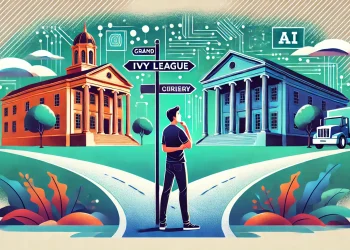No products in the cart.
Harnessing AI for India’s Skill Development
India's ambitious AI initiatives are transforming skill development and job creation, positioning the nation for a competitive future.
New Delhi, India — In a rapidly changing global economy, India stands at the forefront of skill development through artificial intelligence (AI). With a population exceeding 1.4 billion, the country faces a dual challenge: creating jobs while equipping its workforce with the skills necessary for the future. The Indian government’s Skill India Mission, launched in 2015, aims to train over 400 million people by 2022. Now, AI is becoming a pivotal tool in this mission.
The Role of AI in Skill Development
AI technologies are not just about automation; they are reshaping how skills are taught and learned across various sectors. The government is harnessing AI to tailor educational content, assess individual learning styles, and predict future job market trends. For instance, the National Skill Development Corporation (NSDC) has partnered with various tech firms to integrate AI into its training programs, ensuring that they are relevant and effective.
By analyzing vast amounts of data, AI can identify skill gaps in the labor market and recommend targeted training programs. This approach allows for a more personalized learning experience, adapting to the needs of both the learners and the employers. According to a report by the McKinsey Global Institute, by 2030, India could face a shortage of 29 million skilled workers, making it imperative to focus on effective skill development strategies [1].

Job Creation Through AI Initiatives
The Indian government’s investment in AI is not limited to skill training; it also aims to create new job opportunities. According to a study by the NASSCOM, AI could create 1.8 million new jobs in India by 2025. These roles will not only require technical expertise but also a blend of soft skills, critical thinking, and adaptability. Industries such as healthcare, agriculture, and manufacturing are expected to see significant transformations due to AI adoption.
According to a report by the McKinsey Global Institute, by 2030, India could face a shortage of 29 million skilled workers, making it imperative to focus on effective skill development strategies [1].
Moreover, the rise of AI-driven startups in India showcases a burgeoning ecosystem that fosters innovation and job creation. Companies like Zomato and Swiggy have integrated AI to optimize their supply chains, enhancing efficiency and reducing costs. These advancements lead to the creation of numerous indirect jobs, from delivery personnel to data analysts.
Challenges Faced in Implementation
Despite the promising outlook, several challenges hinder the effective implementation of AI in skill development. Access to technology remains a significant barrier, particularly in rural areas, where internet connectivity is inconsistent. The digital divide poses a risk of excluding a substantial segment of the population from these opportunities.
Additionally, there is a pressing need for qualified trainers who can effectively deliver AI-enabled training programs. The current education system often lags behind technological advancements, leading to a mismatch between skills taught and skills needed in the job market. To address these issues, the government is investing in infrastructure and training the trainers, but progress needs to be accelerated.
The Future of AI in India’s Workforce
Looking ahead, India’s venture into AI-driven skill development could redefine the employment landscape. As the economy transitions towards a knowledge-based framework, continuous learning and upskilling will be paramount. The government’s focus on fostering partnerships with private sectors and educational institutions will play a crucial role in this transformation.
Moreover, the emphasis on lifelong learning will encourage individuals to adapt to the ever-evolving job market. Programs like the Digital India initiative aim to bolster digital literacy, ensuring that the workforce is equipped with the necessary skills to thrive in a tech-driven economy [2].
The Future of AI in India’s Workforce Looking ahead, India’s venture into AI-driven skill development could redefine the employment landscape.
In conclusion, India’s proactive approach to integrating AI into skill development presents a unique opportunity for the nation to enhance its workforce capabilities. The success of this initiative will depend on overcoming existing barriers and ensuring inclusivity. As the world increasingly gravitates towards AI, India has the potential to emerge as a leader in this space, shaping a future where technology and human talent converge for mutual growth.











